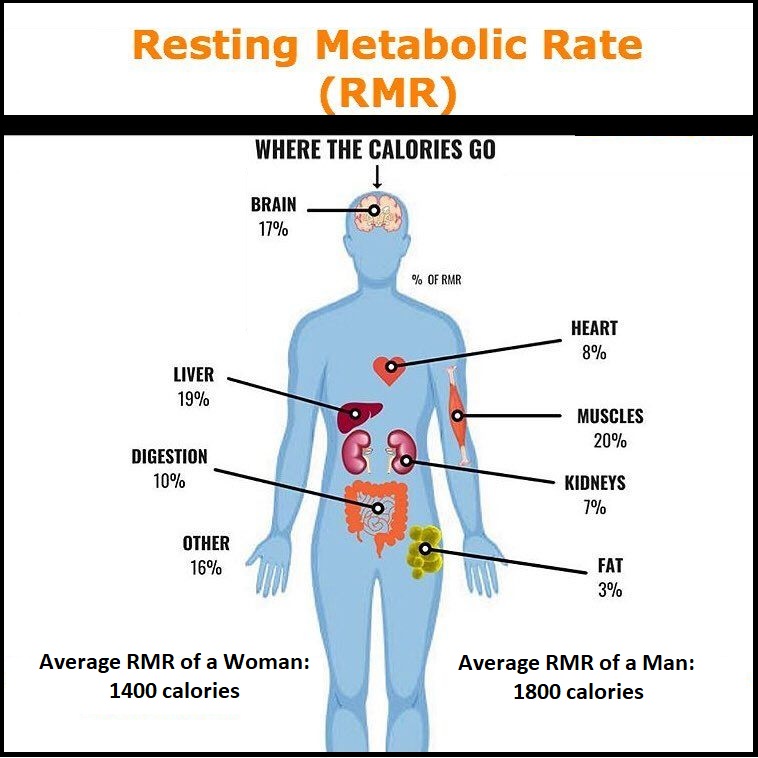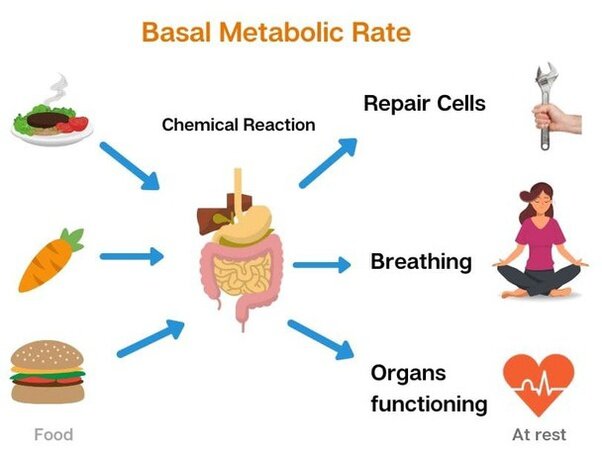How Can I Get A Fast Metabolism?
Men tend to burn more calories than women, even while resting. And for most people, metabolism slows steadily after age 40. Although you can’t control your age, gender, or genetics, there are other ways to improve your metabolism.
Contents

What Is Metabolism?
- Metabolism is defined as the series of chemical reactions that burn calories.
- Those chemical reactions can be further refined into three categories: your resting metabolic rate (RMR), the thermic effect of physical activity (TEPA), and the thermic effect of feeding (TEF).
Resting Metabolic Rate (RMR)
RMR is the number of calories you can eat in a 24 hour period and stay at the same weight.
- Most of the calorie burning you do takes no extra effort at all.
- About 60%-75% of the calories you torch through comes from simply keeping your body operating.
- Like a machine that never turns off, your body is always working, and it always needs fuel, whether you’re running a marathon or sleeping.
- The organs doing most of that extra work are the heart, brain, lungs, liver, and kidneys, which together make up about 80% of the total calories used every day.
- Some people do have a higher RMR than others.
- Children have especially high calorie needs when at rest compared to adults. On average a child under age 6 at rest burns twice as many calories per pound as an adult.
- Between ages 6 and 18, your RMR drops by about 25%, and every decade after that your RMR drops another 2% to 3%.
- That’s mostly because we tend to become less active as we grow older, meaning we tend to lose calorie-burning muscle mass.
Thermic Effect of Physical Activity (TEPA)
- The word “thermic” refers to heat. And in this case, we’re talking about the heat generated while moving.
- That can mean working out, but it can also mean walking to your car or doing the dishes.
- TEPA accounts for about 15% to 30% of your total calories spent in a day, depending on how active you are.
- Even shivering and fidgeting count toward this total.
Thermic Effect of Feeding (TEF)
- About 10% of the calories you use up every day come down to TEF.
- TEF represents all the energy you spend digesting, storing, transporting, and absorbing the food you eat.
You will get lots of suggestions re-diet and exercise such as eating lean protein at every meal, eating many smaller meals daily and weight lifting with a bit of aerobic exercise thrown in AND all are great to make your metabolism more anabolic.
Your metabolism is your body’s engine and as with all engines, it needs high quality fuel. That fuel is caloric in nature. A more anabolic metabolism means that you’ll burn more calories per hour regardless of what you’re doing – reading a book, sleeping, or whatever. It translates into a higher resting metabolic rate (RMR).
All is definitely achievable……BUT, and here’s the kicker, once gained it can all be lost with shitty diets, starvation, lack of exercise………..and you can drop back down to a catabolic (slow inefficient) metabolism.
Ok, let me add this….

- Your RMR is the number of calories you can eat in a 24 hour period and stay at the same weight.
- Your BMR (basal/basic metabolic rate) is the number of calories you need to eat in a 24 hour period just to keep your body alive (your heart beating, your organs functioning, your respiration, biochemical circuitry, etc etc.)
your body will burn calories while it digests the food you eat - Protein is the most inefficiently digested macronutrient; for example if you eat 400 calories of protein, your body uses about 100 calories just to digest it (25%)
- Carbs and fats are more easily digested; for example 400 calories of either of them will cost only 5% or 20 calories and that’s a huge difference!
- If you eat a lot of protein daily, by adding it to every meal, you keep your engine fired up — especially if you do it frequently with 5–6 daily meals
- Strenuous exercise will cost a whack of calories as well, especially weight training which due to both EPOC (excess post-exercise oxygen consumption) and DOMS (delayed onset muscle soreness) will continue to burn calories AFTER you leave the gym for about 1–3 days.
How to Calculate the Speed of your Metabolism
All of the above means the following:
RMR = BMR + thermal energy to digest food + daily physical exercise
Therefore, when you eat a lot of protein and when you lift weights, you get to eat a lot of great nutrient dense foods and not get fat, in fact you lose body fat.
FOR EXAMPLE :
- For me, my BMR is 1200 calories and I get a thermal energy use from food of about 225 calories and from exercise I will burn about 300 daily.
- That means I can eat 1725 calories daily and stay at the same weight.

- If I eat more than my BMR (1200) and less than 1725, I can lose weight at about 1–2 pounds/week.
- If I eat more than 1725 calories daily then I will gain weight.
Starvation And Metabolism
- Starvation to your body means that you’re eating far less then your BMR needs.
- After a while your body begins to dump muscle because it’s calorie dependent and if there aren’t sufficient calories then your body, your savior, just dumps muscle.
- Seems reasonable to do so, why retain tissues that aren’t being fed enough??
- And that means that your body fat percentage will increase.
- That’s why starvation will NEVER give you toned arms and nice defined muscles. Just not possible without the caloric intake with exercise.
Now you know why most Personal Trainers are always measuring a client’s body fat percentage. It is a fabulous indicator of someone’s overall health.
Using Metabolism To Gain Or Lose Weight Faster
- But this sort of RMR measurement is dependent on a person’s goals.
If I want to lose fat and gain a ton of muscle,
- I can actually eat more then 1725 with tons of protein (40–45% of daily calories) and
- fewer carbs (30%) and
- fats (25–30%) and
- exercise daily for at least an hour of serious weight lifting.
That’s why you see all those weight lifters and body builders eating all the time!! Because they can and they’re gaining muscle and losing fat at the same time.
REFERENCES:
- Harvard Health: “The Truth About Metabolism.”
- US National Library of Medicine: “Can you boost your metabolism?” Oct. 5, 2021.
- Am J Clin Nutr: “Comparison of thermic effects of constant and relative caloric loads and obese men.”
- CDC: “Physical Activity and Health.”
- Cochrane: “Green tea for weight loss and weight maintenance in overweight or obese adults.”
- Endocrine Society: “Hypothyroidism.”
- Harvard Medical School: “Does Metabolism Matter in Weight Loss?”


